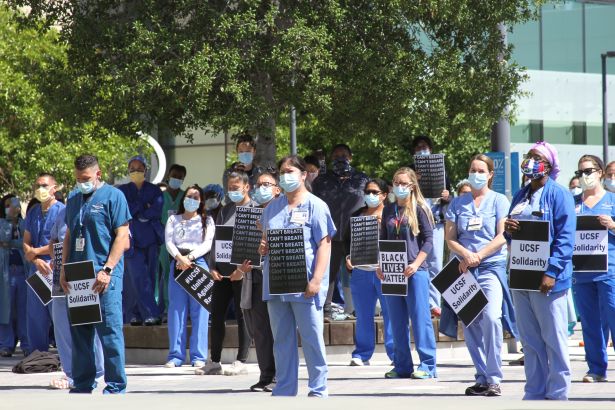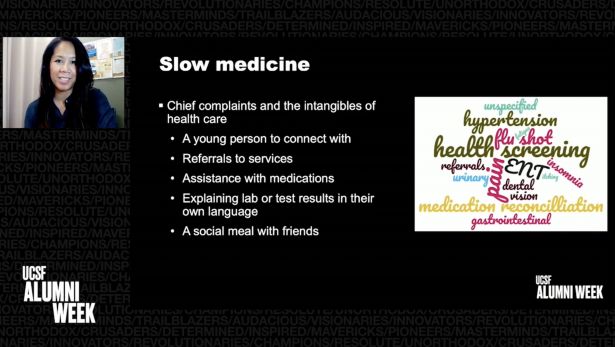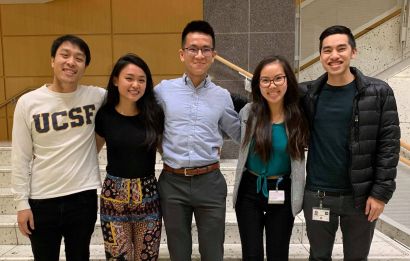- About
- Organization
- Organization Overview
- Dean’s Office
- Department of Bioengineering and Therapeutic Sciences
- Department of Clinical Pharmacy
- Department of Pharmaceutical Chemistry
- Quantitative Biosciences Institute
- Org Chart
- Research
- Education
- Patient Care
- People
- News
- Events
Update from the Dean: Confronting racism and health inequities
Our COVID-19 response
By B. Joseph Guglielmo / Fri Jun 19, 2020
Dear UCSF School of Pharmacy Family and Friends:
June 19, Juneteenth8, is the celebrated commemoration of the ending of slavery in the United States. However, our nation continues to be shaken to its core by racism and violence directed against Black Americans. The current state of affairs deeply disturbs me.
The long history of racism against communities of color includes discriminatory laws, segregated education, restrictive housing practices, and unequal healthcare.
We can no longer look the other way when racism stares us in the face. We must call out racism, unfair practices, and other biases when we see them in ourselves, in our institutions, and in others. We must let our voices be heard and be voices for the voiceless. We must shed complacency and embrace anti-racist actions of all kinds. This is the only path to eliminating the gross inequities and disparities that exist in our country.

Heather Hoover
Members of the UCSF community attend a Black Lives Matter solidarity rally at UCSF Medical Center in Mission Bay on June 3.
We must talk about these issues openly and without judgment. Vice Dean Sharon L. Youmans, PharmD, MPH, and I shared our thoughts on the killing of George Floyd9 in Minnesota, and the other killings of people of color which have captured the nation’s attention. Since that email, Georgia police shot and killed another Black man, Rayshard Brooks.
I wholeheartedly support the right of our students, faculty, and staff to participate in marches and protests demanding change. However, for those who elect to participate in such protests, please do so safely. I strongly encourage you to review UCLA’s guidelines for reducing coronavirus transmission during civil protest10.
In addition, the Centers for Disease Control and Prevention (CDC) recommends that anyone participating in marches, protests, or any other large group gatherings consider getting a COVID-19 test 3 to 7 days after the event. In San Francisco, there are several testing options, including the Fillmore pop-up testing site, which offers tests, including for asymptomatic persons.
COVID-19 exposes health inequities
These tumultuous events take place as the nation is already reeling from the COVID-19 pandemic, which has further revealed inequities, disproportionately impacting already underserved communities.
A study of COVID-19 testing in San Francisco’s Mission District last month11 revealed that 95 percent of the COVID-19 cases were Hispanic or Latinx people. The greatest risk factor for infection was the essential nature of their employment and inability to shelter in place. A recent study revealed that Black, Latinx, and Native American people in the U.S. are dying from COVID-19 at a much higher rate than their fellow citizens12. Put starkly, “if they had died of COVID-19 at the same rate as white Americans, at least 14,400 Black Americans, 1,200 Latino Americans and 200 Indigenous Americans would still be alive.”
The coronavirus isn’t going away. As I write to you, 15 to 20 states are experiencing an upsurge in COVID-19 cases, including California. At the local level, our San Francisco community is faring somewhat better. Officials have allowed child care centers to reopen and are easing restrictions on indoor retail and outdoor dining. While these transitions are welcome developments, the national numbers clearly reveal that we cannot let down our guard. We must be ready for anything, including the likely second wave of the virus.
Progress and timelines for reopening campus
People are slowly making their way back to campus. As of June 8, our research labs reached Phase 2 of reopening13, allowing them to operate at 25% of capacity.
On May 29 I disseminated a campus-wide email which was similarly distributed by other deans and program leaders to their respective constituencies. The campus message stated that the campus is recommending that those who can perform their duties remotely continue to do so until January 18, 2021 and that non-essential, in-person events and gatherings not be held until at least June, 2021.
While these dates are somewhat startling, the School is fully prepared for any eventuality. Furthermore, the School is willing to consider exemptions to these dates if the pandemic situation and government orders allow. That said, I reiterate, if employees can efficiently carry out their duties remotely, they should continue to do so.
Owning the budgetary impact
As I have written previously, the pandemic will have a major impact on finances for the entire UC system. UCSF Chancellor Sam Hawgood, MBBS, has informed the School that we should be prepared for reductions in allocations ranging from 5 to 10 percent.
Associate Dean Michael Nordberg, MPA/HSA, and I have asked the Office of the Chancellor to give us the flexibility to address required budget cuts, as opposed to being informed how the cuts should be implemented. At this time, furloughs, staff reductions, and changes to compensation are among the last options we will consider.
A new chair for Pharmaceutical Chemistry
In the middle of all this turmoil, our School plans for the future. On that note, I am delighted to announce that Michelle Arkin, PhD, will serve as the eleventh chair of the Department of Pharmaceutical Chemistry, effective January 4, 2021.
For many years Michelle has co-led—with Adam Renslo, PhD—the Small Molecule Discovery Center14, which develops unique chemical probes and candidate drugs. Similarly, Michelle’s research lab focuses on developing new molecules that interact with proteins, leading to starting points for drug discovery. Michelle is a faculty affiliate of both the Quantitative Biosciences Institute (QBI)15 and the Helen Diller Family Comprehensive Cancer Center16. She earned her PhD in chemistry from the California Institute of Technology.
While there will be more to come on this announcement, I want to offer a hearty congratulations to Michelle.
Kudos as well to Matt Jacobson, PhD, for his exceptional leadership as the chair of the Department of Pharmaceutical Chemistry since 2016. True to his generous nature, Matt has agreed to continue as chair until Michelle is able to assume her new role.
I’m happy to bring you more news from our School as we adapt and succeed even in these trying times.
Stay safe.
With warm regards,

B. Joseph Guglielmo, PharmD
Dean
Troy C. Daniels Distinguished Professor of Pharmaceutical Sciences
UCSF School of Pharmacy
Alumni Weekend goes virtual
The events for Alumni Weekend 2020 were necessarily held online this year. However, the change came with a silver lining: virtual panel discussions became available to a much broader audience and events lasted for a whole week. I hope you had the chance to tune in.

As part of a virtual panel discussion at UCSF Alumni Week 2020, Jennifer Cocohoba, PharmD, explains the concept of “slow medicine” that she applies in her work with the Mabuhay Health Center in San Francisco.
One Alumni Week panel featured Jennifer Cocohoba, PharmD, who specializes in HIV/AIDS. Jennifer discussed her work as faculty advisor and research mentor at the Mabuhay Health Center17. Mabuhay is a student-run UCSF clinic that serves the South of Market (or SoMa) neighborhood of San Francisco. She highlighted, in particular, the clinic’s use of “slow medicine,” which gives practitioners more time with their elderly patients, who are among San Francisco’s most vulnerable citizens.
A second panel, featuring Vice Dean Sharon L. Youmans, explored how UCSF education programs have been affected by COVID-1918. Sharon spoke to the challenges we face keeping our students, staff, and faculty safe from COVID-19 infection, while also providing a sense of community, particularly for our students. According to Sharon, “students crave communication.” To that end, she recommended communications be both frequent and transparent.
Excellence in funding
The American Association of Colleges of Pharmacy (AACP) released their latest nationwide report on research funding among schools of pharmacy19. Once again, our School was number one in total funding, National Institutes of Health (NIH) funding, non-NIH Federal funding, and non-Federal funding … and not by a slim margin!
In total the School had over $69 million of total research funding: $47 million of which originated from the NIH, $9 million from other federal sources, and $13 million from other funding sources. The funding received by the next-closest pharmacy school, the University of North Carolina at Chapel Hill, totaled $39 million.
You may remember that we reported our number one ranking in NIH funding earlier20 this year for the 40th year in a row. That survey, performed by Blue Ridge Institute for Medical Research, used data specifically obtained from the Research Portfolio Online Reporting Tools (RePORT) from the National Institutes of Health, i.e., those grants in which faculty members served as principal investigators (PIs). This more recent AACP methodology uses much broader criteria than the previous survey, including sub-PI, co-PI, and many other funding sources.
Another competition win for our PharmD students

From left to right: Andrew Hean, Class of 2022; Leanne Liu, Class of 2022; Alex Huang, Class of 2021; Connie Do, Class of 2022; and Sam Trinh, Class of 2022.
Congratulations to PharmD students Alex Huang, Class of 2021, and Connie Do and Leanne Liu, both Class of 2022, for their third place team finish at the 2020 American College of Clinical Pharmacy (ACCP) Clinical Research Challenge21. Alex, Connie, Leanne, and team alternates Andrew Hean and Sam Trinh, both Class of 2022, spent nearly six months formulating a research question, designing a study protocol, and writing a grant proposal, “Impact of Student Pharmacist-Led Educational Intervention on the Management of Gestational Diabetes (SPEID).” The group competed against teams from 85 other pharmacy schools.
A special thank you to the team’s faculty liaison, Tina Denetclaw, PharmD, who mentored the team. “The team’s choice of research question, the quality of their study design, and the clarity of their grantsmanship were remarkable for students in their first and second years of pharmacy school,” Tina says. “I was proud of their work, every step of the way.”
Recognizing efforts in resiliency education
Congrats to Amanda “Mandy” Morris, PharmD, and Eleanor “Ellie” Vogt, PhD, who are the 2020 recipients of the American Association of Colleges of Pharmacy (AACP) Innovations in Continuing Professional Development award.
Mandy and Ellie were recognized for their creation of the UCSF Certificate of Resiliency Medicine Training22, a requirement in the UCSF PGY1 residency program. The training equips pharmacy residents with the skills needed to maintain personal and professional well-being as health care providers.
Continued progress searching for COVID-19 treatments
I have spoken at length about the work of the Quantitative Biosciences Institute (QBI), the School’s organized research unit, and its timely work assembling the QBI Coronavirus Research Group (QCRG). Under the leadership of QBI Director Nevan Krogan, PhD, the group has made important strides toward finding existing drugs that could treat COVID-19. He recently answered questions about the group’s discoveries and what’s next23.
Losing some amazing talent
Five of our most-esteemed colleagues, Nancy Hessol, MSPH; Tom Kearney, PharmD; Don Kishi, PharmD; Susie Levings, MS; and Kevin Rodondi, PharmD, are retiring effective July 1. Collectively, they gave decades to our School and have profoundly, positively, and indelibly influenced our institution. While their retirements are our loss, I sincerely congratulate them and celebrate their careers and contributions.

From left: Kevin Rodondi, PharmD; Nancy Hessol, MSPH; Susie Levings, MS; Don Kishi, PharmD; Tom Kearney, PharmD.
Tags
Topics:
Category:
Sites:
School of Pharmacy, Department of Pharmaceutical Chemistry, Department of Bioengineering and Therapeutic Sciences, Department of Clinical Pharmacy, PharmD Degree Program
About the School: The UCSF School of Pharmacy aims to solve the most pressing health care problems and strives to ensure that each patient receives the safest, most effective treatments. Our discoveries seed the development of novel therapies, and our researchers consistently lead the nation in NIH funding. The School’s doctor of pharmacy (PharmD) degree program, with its unique emphasis on scientific thinking, prepares students to be critical thinkers and leaders in their field.









